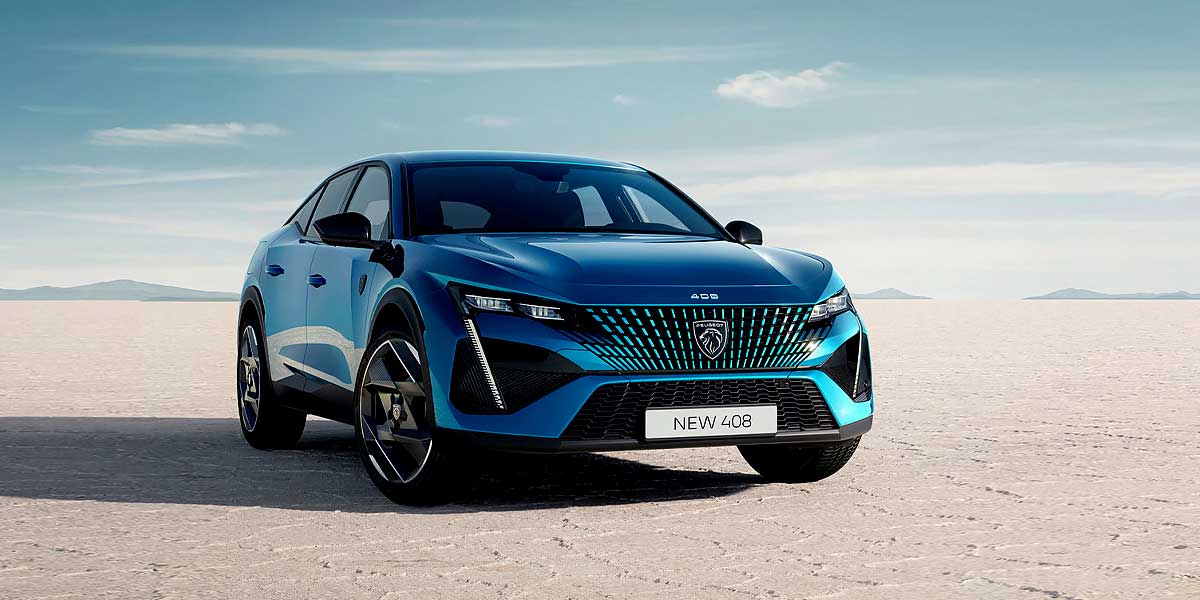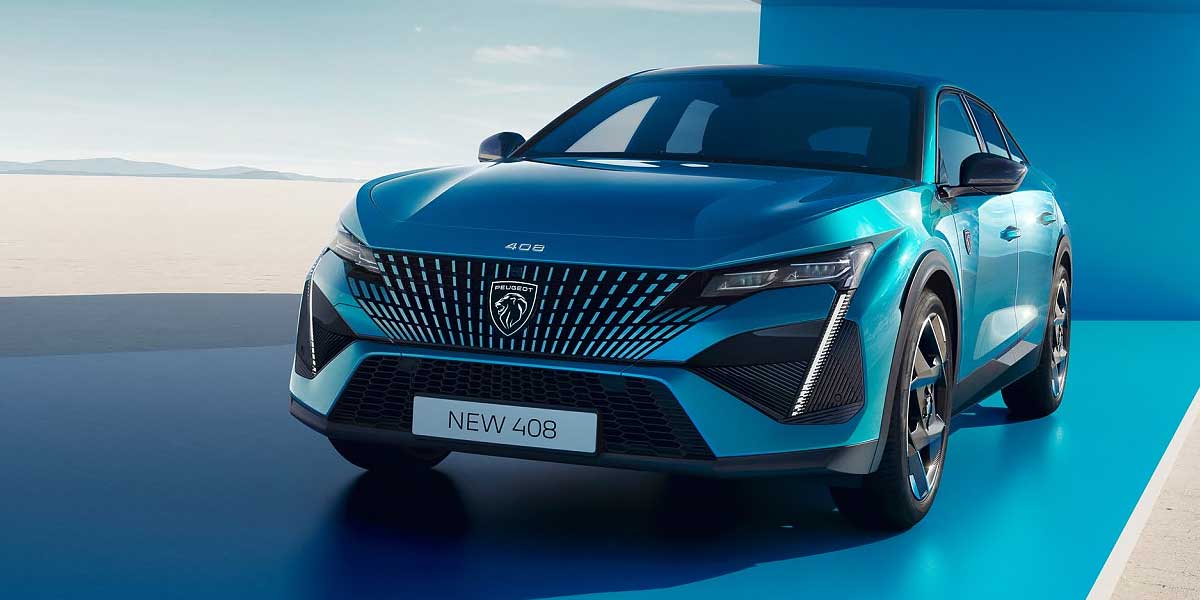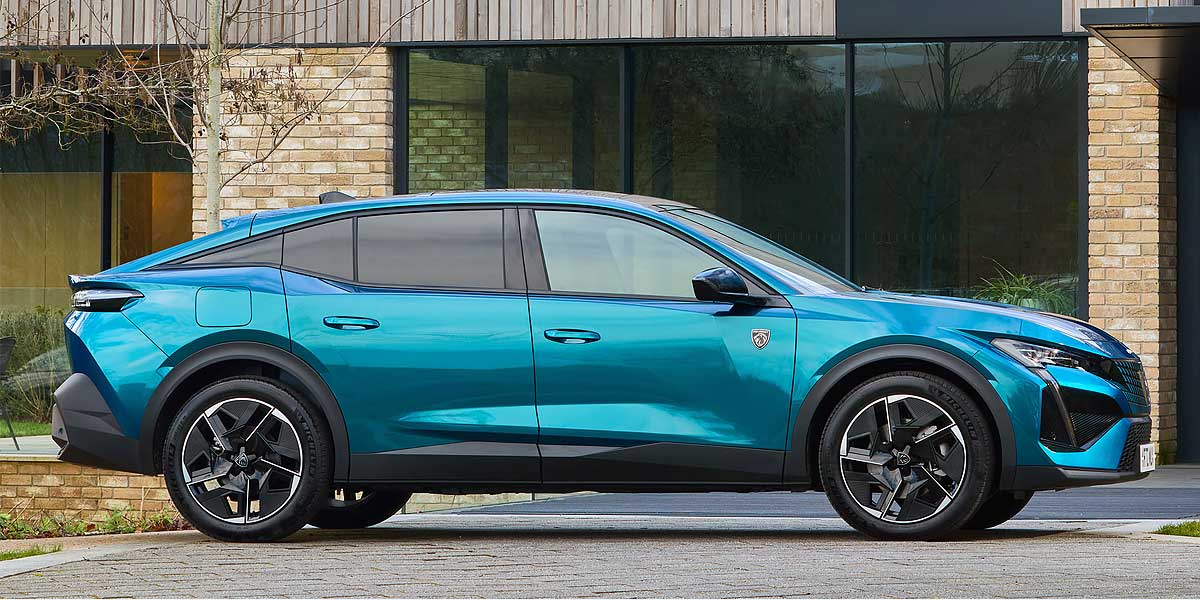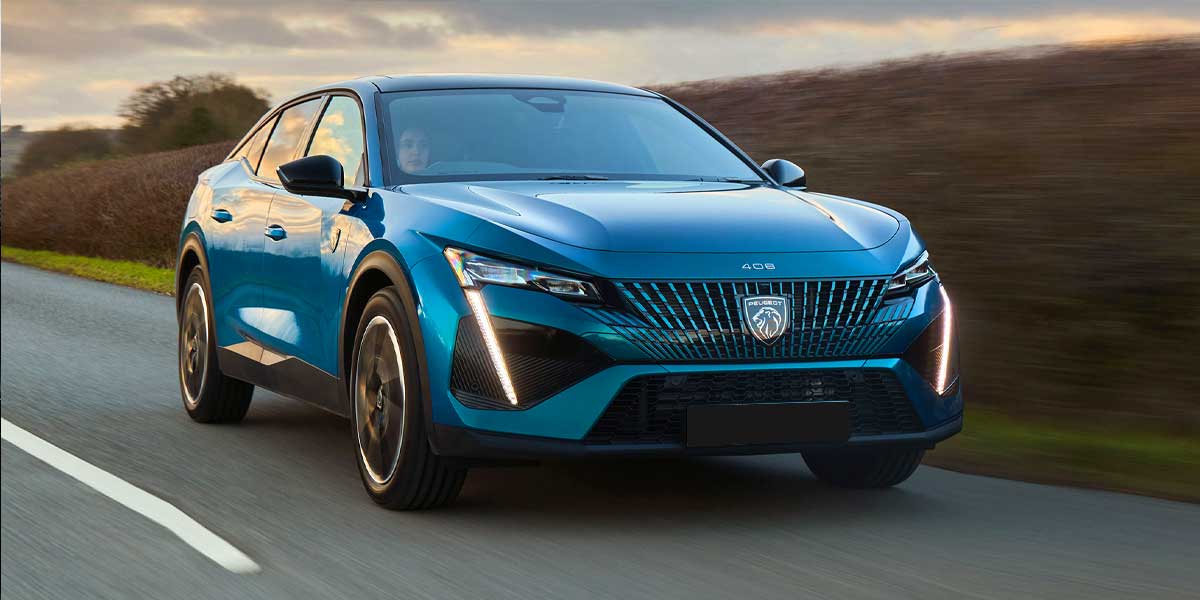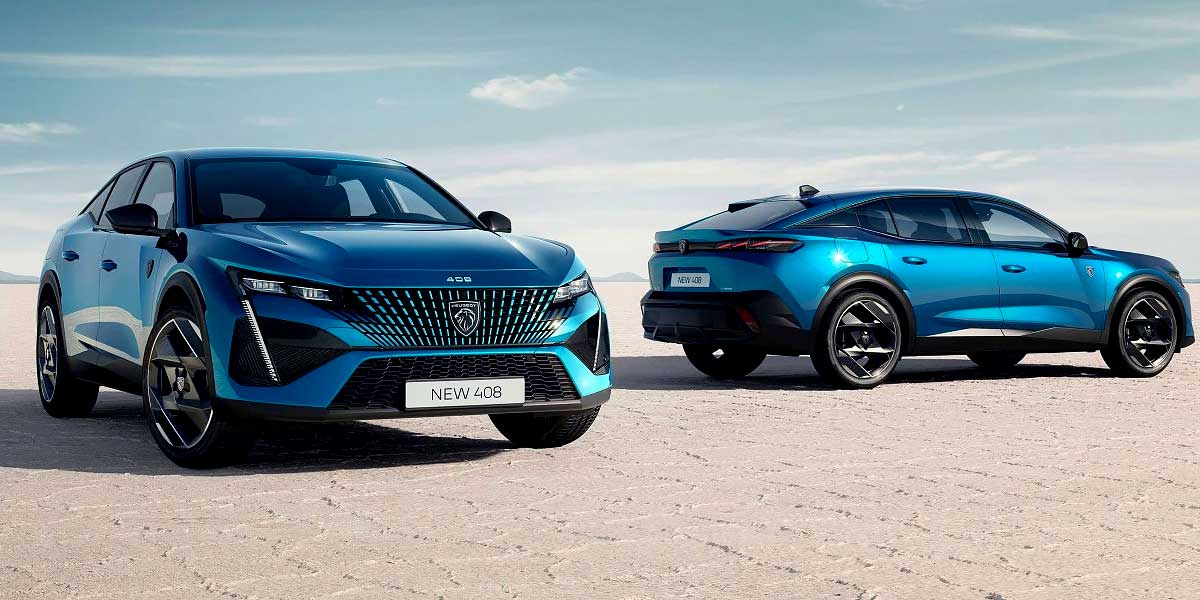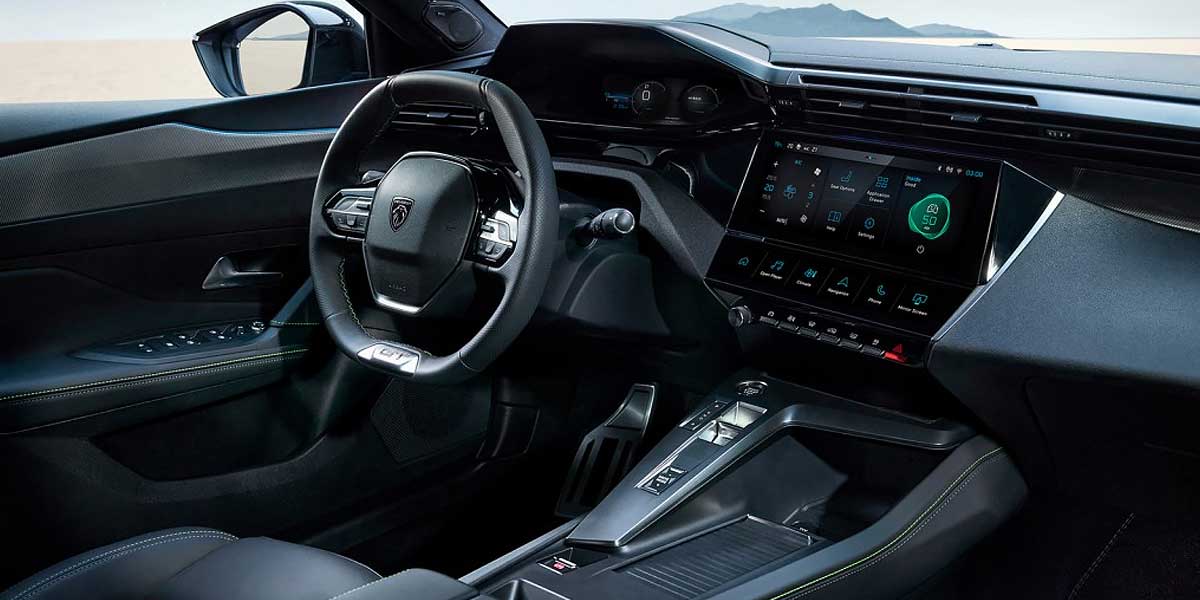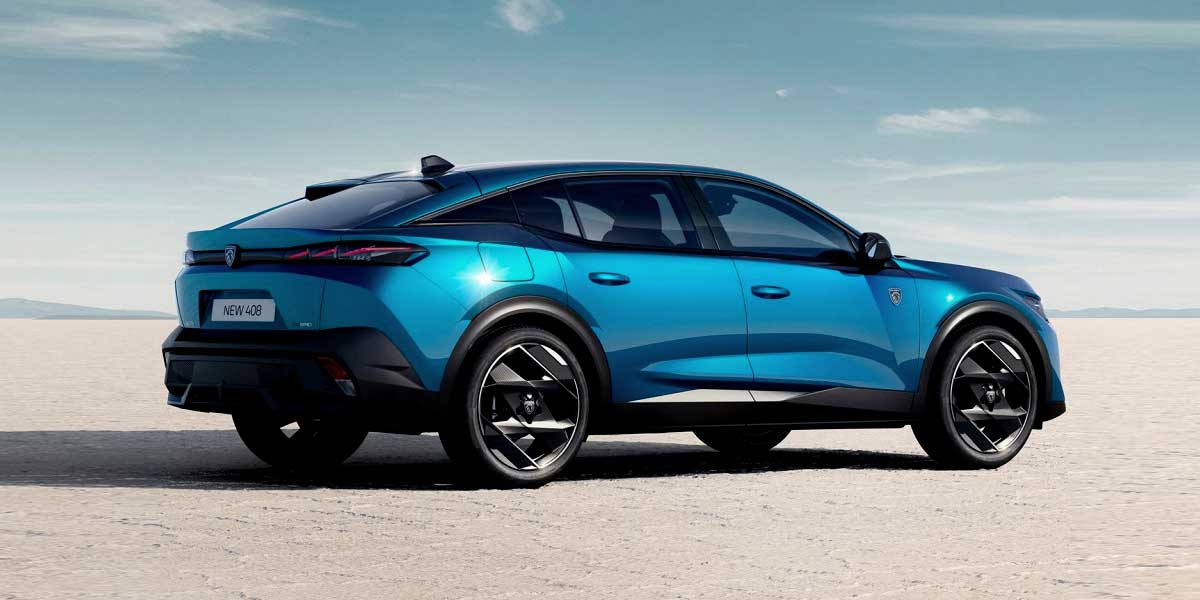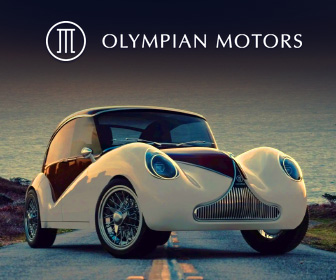Peugeot e-408
The Peugeot e-408 is set to blend the practicality of an SUV with the style of a fastback saloon. Manufactured in France, coming in 2025, it offers a range of 453 km, with a 61 kWh battery. Expected price starts at US$ 44,700. This hatchback flaunts a max speed of 233 km/h and goes from 0 to 100 km/h in 7.8 seconds, powered by 210 hp.
User Rating: 4 / 5 (79 votes)





Base Trim Price: $44700 USD *
| Body Type | hatchback |
| Model Year | 2025 |
| Manufactured in | France |
| Battery Capacity (kWh) | 61 |
| Electric range (km) | 453 |
| Max. Speed (km/h) | 233 |
| Acceleration 0-100 km/h (sec) | 7,8 |
| Power (h.p.) | 210 |
| Drive Type | FWD |
* Minimum price set for the base trim by the manufacturer
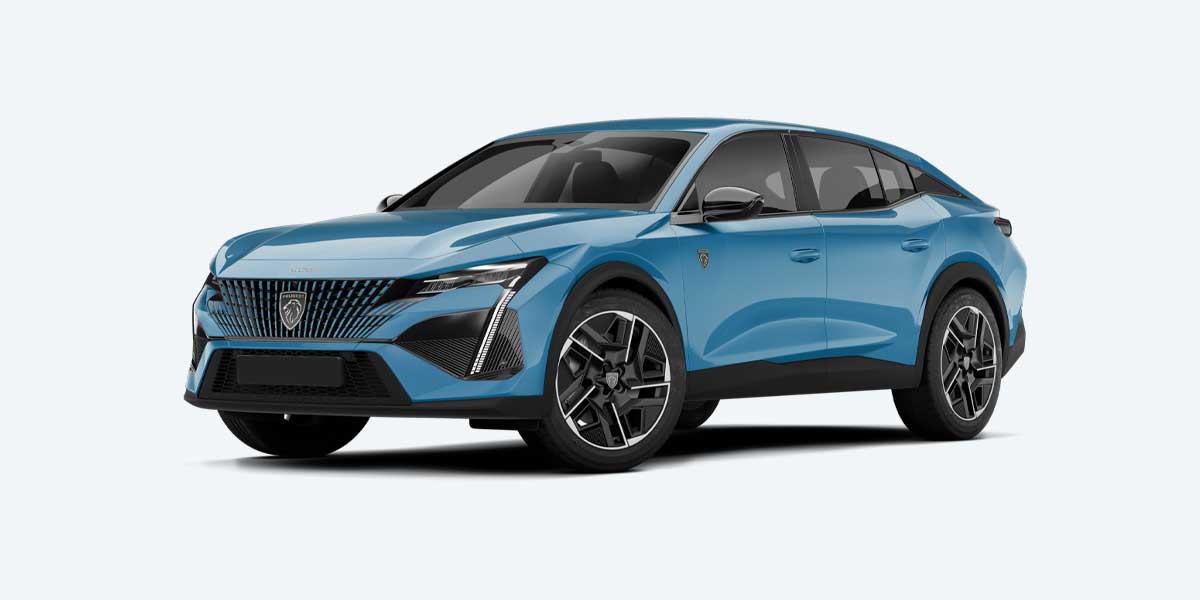
Peugeot e-408 Review
The Peugeot e-408 signals a significant leap for the French manufacturer, blending the utility of an SUV with the sleek aesthetics of a fastback sedan. Competing in the same realm as the VOLKSWAGEN ID 4, this electric vehicle (EV) stands out due to its mixed form factor, extensive range, and robust functionalities.
Design and Build
Eye-catching Aesthetics
The new e-408’s name might resonate with the older 407 D-segment saloon, but it’s firmly aimed at the apex of the C segment. Spanning 4690 mm in length and 1480 mm in height with a 2790 mm wheelbase, it surpasses the size of the Peugeot 308 and even the ID 4. The design sports a high SUV-like stance paired with a fastback silhouette, emphasizing aerodynamics while preserving a striking appearance. The front grille and 'tiger-claw' LED lights are refreshed to match Peugeot's latest stylistic language.
Platform and Dimensions
Constructed on Stellantis' EMP2 V3 platform—the same used across Peugeot's family including Citroen, DS, and Fiat—the e-408 embodies efficient engineering principles. Noteworthy are the roof's 'car ears', which cleverly direct airflow and reduce drag, contributing to its superior energy efficiency. The vehicle sits on wheels ranging from 17 to 20 inches, indicating flexibility in customization for future owners.
Performance and Specifications
Robust Powertrain
The Peugeot e-408 boasts a 210 horsepower motor, offering a balanced performance for an electric hatchback. Its power is delivered via a front-wheel drive (FWD) configuration, common in many of its peers. With a range of 453 km, outstripping many competitors, it positions itself as a practical option for both city commutes and longer drives.
Speed and Efficiency
Acceleration from 0 to 100 km/h takes just 7.8 seconds, achieving a maximum speed of 233 km/h. While the EV’s 61 kWh battery might seem modest, it’s engineered efficiently to deliver on performance metrics while ensuring durability and longevity. The BEV variant's weight starts from 1426 kg, slightly heavier than its petrol counterpart, yet maintaining commendable agility and handling.
Battery and Charging
Equipped with a 61 kWh battery, the e-408 promises a significant range and efficient energy consumption. Charging time specifics are yet to emerge, but Peugeot’s commitment to electrification suggests rapid charging capabilities are a given, making the vehicle practical for daily use and long-distance travel alike.
Price and Market Position
Peugeot aims to release the e-408 at a starting price of $44,700 (approx. £40,000 or €45,000). This places it slightly higher than its petrol sibling, expected due to its premium electric drivetrain and advanced features. Still, in the crowded EV market, it’s competitively priced against models like the VOLKSWAGEN ID 4.
Interior and Technology
Advanced Cockpit
The interior doesn't fall short either. Peugeot’s i-Cockpit design, characterized by a compact steering wheel and a 10-inch digital driver display, ensures a futuristic drive experience. The higher trims come with a 3D-effect display and an additional central 10-inch touchscreen, catering to tech-savvy and modern customers.
Comfort and Customization
The vehicle’s dimensions and design ensure ample cabin space, combining comfort with a modern aesthetic. From urban groceries to weekend getaways, the e-408 promises versatility without compromising on style or performance.
Exterior and Interior photos of Peugeot e-408
Watch the Video Overview
F.A.Q. about Peugeot e-408
What is the range of an electric vehicle on a single charge?
The Peugeot e-408 offers a range of 453 km per charge, making it highly competitive in its class.
How long does it take to fully charge an electric vehicle?
While specific charging times for the e-408 aren't disclosed yet, we anticipate rapid charging capabilities to ensure it’s practical for daily use and longer journeys.
Are electric vehicles more expensive than gasoline cars?
Yes, electric vehicles like the Peugeot e-408 are generally more expensive upfront, with the e-408 starting at around $44,700 (£40,000 or €45,000). However, they offer savings on fuel and maintenance over time.
What is the price of a car?
The Peugeot e-408 is priced at approximately $44,700, which is around £40,000 or €45,000, positioning it competitively in the market for premium EVs.
What is a battery capacity?
The Peugeot e-408 features a 61 kWh battery, providing a well-balanced blend of power and range, appropriate for both city and long-distance driving.
What is top speed?
The Peugeot e-408 can achieve a maximum speed of 233 km/h, making it one of the faster vehicles in its class.
What is total power?
The Peugeot e-408 is powered by a 210 horsepower motor, delivering robust performance for an EV.
Can electric vehicles be charged at any charging station?
Yes, the Peugeot e-408 can be charged at most public and home charging stations, ensuring flexibility and convenience for owners.
What are the environmental benefits of electric vehicles?
Electric vehicles like the Peugeot e-408 have significantly lower emissions than traditional gasoline cars, contributing to reduced pollution and a smaller carbon footprint.
Do electric vehicles qualify for government incentives or rebates?
Yes, many electric vehicles, including the Peugeot e-408, qualify for various government incentives and rebates aimed at encouraging the adoption of cleaner technologies.
Comparison:
Peugeot e-408: Leading the Charge in Practicality and Style
The Peugeot e-408 signals a significant leap for the French manufacturer, blending the utility of an SUV with the sleek aesthetics of a fastback sedan. Competing in the same realm as the Volkswagen ID.4, Hyundai Kona Electric, and Nissan Ariya, this electric vehicle (EV) stands out due to its mixed form factor, extensive range, and robust functionalities.
Range
The Peugeot e-408 boasts a range of 453 km (282 miles). Comparatively, the Volkswagen ID.4 offers up to 402 km (250 miles), the Hyundai Kona Electric around 449 km (279 miles), and the Nissan Ariya approximately 482 km (300 miles). Clearly, the e-408 is poised well in terms of distance per charge.
Acceleration
Accelerating from 0 to 100 km/h (62 mph) in 7.8 seconds, the e-408 is on par with the Hyundai Kona Electric at 7.6 seconds. The Volkswagen ID.4 and Nissan Ariya are slightly slower, clocking in at 8.5 seconds and 7.5 seconds respectively. This places the e-408 among the zippier options in this segment.
Power
With 210 horsepower, the e-408 offers substantial power, overshadowing the Volkswagen ID.4's 201 hp and Hyundai Kona Electric’s 201 hp. The Nissan Ariya, however, edges ahead with variants offering up to 248 hp, giving it a slight advantage in brute force.
Charging Time
Charging specifics for the e-408 aren't fully disclosed yet. The Volkswagen ID.4 offers an 80% charge in about 38 minutes using a fast charger, while the Hyundai Kona Electric needs around 54 minutes for the same. The Nissan Ariya, on a fast charger, takes about 35 minutes. The e-408, if aligned with industry standards, should offer competitive fast charging times.
Price
Peugeot aims to release the e-408 at a starting price of $44,700 (approx. £40,000 or €45,000). This places it slightly higher than its petrol sibling, expected due to its premium electric drivetrain and advanced features. Still, in the crowded EV market, it’s competitively priced against models like the Volkswagen ID.4.
Interior and Technology
Advanced Cockpit
The interior doesn't fall short either. Peugeot’s i-Cockpit design, characterized by a compact steering wheel and a 10-inch digital driver display, ensures a futuristic drive experience. The higher trims come with a 3D-effect display and an additional central 10-inch touchscreen, catering to tech-savvy and modern customers.
Comfort and Customization
The vehicle’s dimensions and design ensure ample cabin space, combining comfort with a modern aesthetic. From urban groceries to weekend getaways, the e-408 promises versatility without compromising on style or performance.

